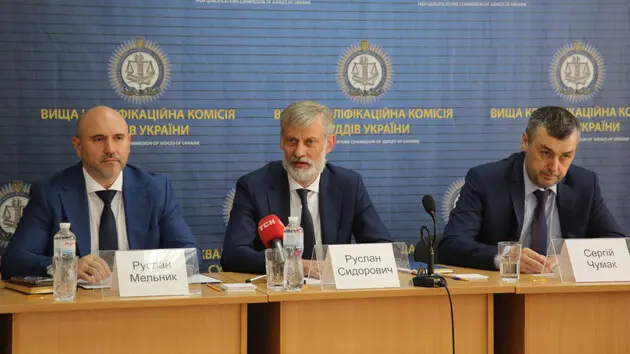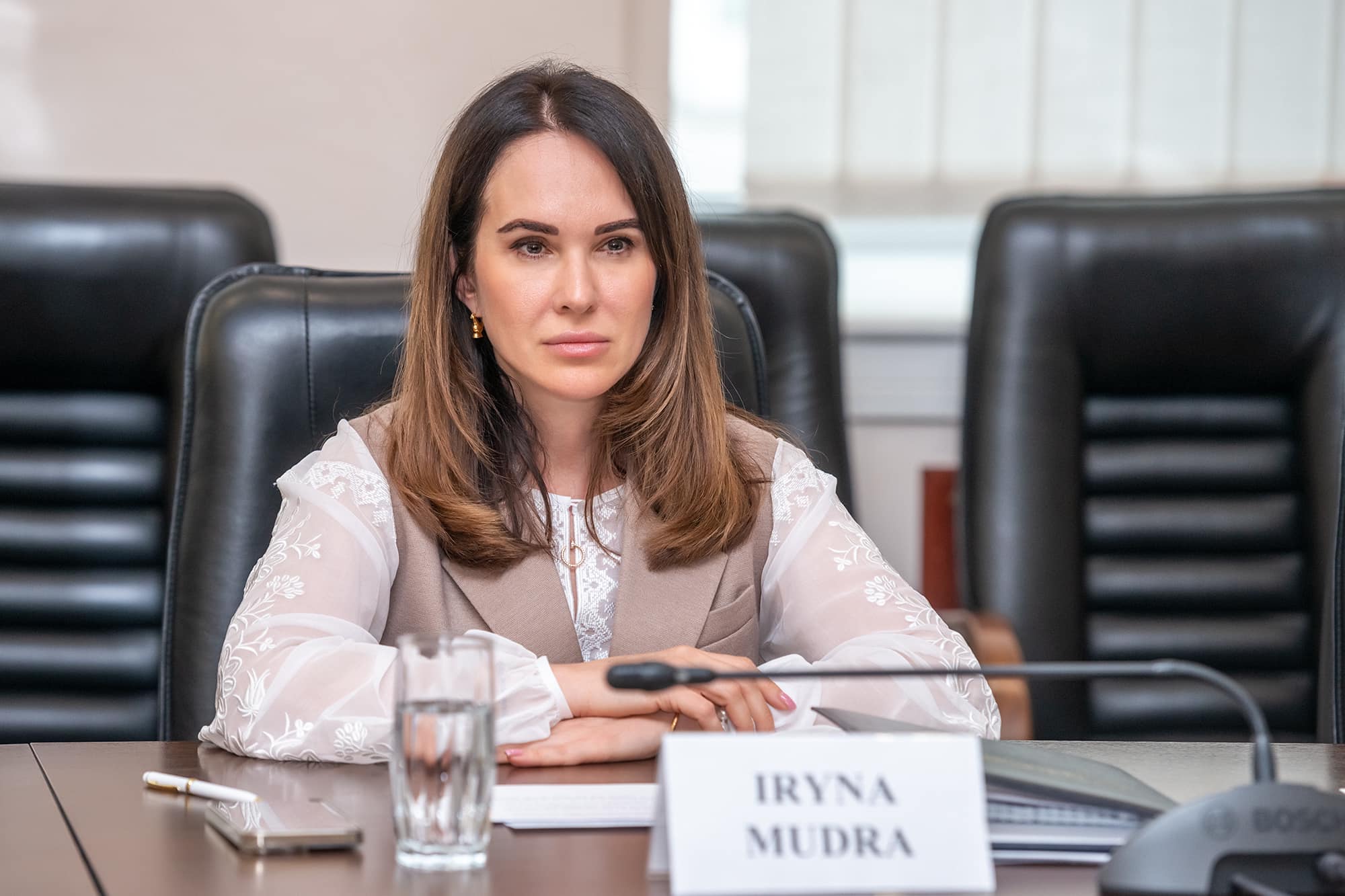Judicial reform. What is Happening with Competitions to the Courts?

This week marks a year since the High Qualification Commission of Judges of Ukraine resumed its activities after almost four years of suspension. In essence, this means that two bodies of judicial governance, responsible for the implementation of judicial reform, have been working fully for a year – the High Qualification Commission of Judges of Ukraine and the High Council of Justice.
In May, Ukrainian President Volodymyr Zelenskyy appointed 114 judges to courts of first instance for the first time since the beginning of the full-scale invasion. And this is an unconditional victory, first of all, for common sense. After all, after the restoration of the work of the High Council of Justice and the High Qualification Commission of Judges of Ukraine, the main principles of which the electorate does not understand at all, it is necessary to move on to filling the courts with new personnel. And the presence of "living" judges in the courts, where the personnel shortage sometimes reaches 62% (appellate general courts), is a small but real result that can be presented to both strategic partners and voters.
Otherwise, both of them will start asking uncomfortable questions: why are there no judges at all in 11 courts, and only one judge works in 42 courts? Why is it not just difficult to get a court decision on a pension in the capital of our country, but almost impossible? Why was the notorious Administrative District Court of the city of Kyiv liquidated in December 2022, and 33,500 cases of this court in a year and a half are still not distributed among the judges of the Kyiv District Administrative Court, where there is also a significant shortage of judges?
So, in this publication, we will analyze how and where the procedures for appointing judges are moving as a component of judicial reform and whether the political authorities are ready not to interfere in these processes.
Two baskets
The appointment of 114 judges was preceded by a number of events of a political and personnel nature.
At the personnel level, the future judges overcame a seven-year (!) marathon of selection (forcibly stopped for four years due to the dismissal by the parliament in November 2019 of the previous members of the High Qualification Commission of Judges of Ukraine).
It consisted of training at the National School of Judges, several stages of exams (before and after training), choosing a court according to the place in the ranking (the candidate with the highest rating chooses the court first, the second in the ranking - the second, etc.) and a final interview at the High Qualification Commission of Judges of Ukraine. And by the way, about 10% of the winners of the competition did not pass it successfully. As a result, the High Qualification Commission of Judges of Ukraine provided recommendations for appointment to local courts to 390 candidates. Although this commission planned to fill all 560 vacancies for which the competition was announced.
If we take the general numbers of the 2017 selection, then only about 20% of the participants will eventually wear the judge's robes. At the same time, some of them received recommendations for appointment as judges even during the work of the previous members of the High Council of Justice and the High Qualification Commission of Judges of Ukraine. But this part of the participants "delayed" from 2020-2021 in the office of the President of Ukraine, thus violating the Constitution of Ukraine (according to the Basic Law, the President of Ukraine must appoint judges within 30 days after receiving a submission from the High Council of Justice.
Our sources inform us that these appointments were blocked by Andrii Smyrnov, the profile deputy head of the office of the President of Ukraine at the time, because some of these candidates applied for positions in the "fashionable" Kyiv courts – Pechersk, Shevchenkivsky, District Administrative Courts of the city of Kyiv (that is, those where decisions are made against of central government bodies). Currently the National Anti-Corruption Bureau of Ukraine (NABU) and the Specialized Anti-Corruption Prosecutor's Office (SAPO) are conducting an investigation against Smirnov on charges of illegal enrichment.
On April 26, the new deputy Iryna Mudra announced that she had conducted an inventory of the applications for appointment to the positions of judges, which had arrived at the office of the President of Ukraine at different times, and had divided the submissions into "two baskets". The first basket is the judges selected by the new composition of the High Qualification Commission of Judges of Ukraine and the High Council of Justice. The second is the submissions received for updating the composition of the High Qualification Commission of Judges of Ukraine and the High Council of Justice. "I will try to "launch" the submissions proposed by the new composition of the High Qualification Commission of Judges of Ukraine and the High Council of Justice as soon as possible for the President of Ukraine to sign the appointment decrees."
Iryna Mudra fulfills her promise to process submissions from the "first basket". 114 judges have moved to local courts, 70 of them are newly appointed judges. Although they themselves cannot administer justice at the moment: the law requires them to take the oath of a judge for this. But it is definitely not worth delaying the swearing-in of the office of the President of Ukraine, because judges are already receiving salaries, and they are not engaged in hearing court cases.
Candidates from the "second basket" are still waiting for appointment, and the situation looks, to put it mildly, strange: they are not appointed, they are not refused appointment, some have already gone to the second competition and independently wrote a refusal from the court that the candidate chose in 2019 , in order to receive an appointment to the court that this candidate chose in 2023.
So it seems that the ceremonial role of the president has acquired some other meaning, not provided for by the Constitution of Ukraine. But the problem is also that the the representatives of the High Council of Justice do not react to this in any way, whose submissions, in fact, were distributed to "baskets".
The (un)ceremonial role of the President of Ukraine
Even during the development of changes to the Constitution of Ukraine (regarding justice), which were adopted in 2016, Ukraine twice turned to the Venice Commission for the analysis of such changes. The Venice Commission then answered quite unambiguously that the role of the president should be exclusively ceremonial, and all decisions regarding judges should be made by the High Council of Justice. Let us quote one of the quotes of the High Qualification Commission of Judges of Ukraine: "The President of Ukraine plays a ceremonial role: he appoints candidates submitted by the Supreme Council of Justice, whose proposals will be binding on the President. The law will have to regulate possible delays or difficult situations in the appointment of judges by the President of Ukraine."
Everything is quite clear. However, unfortunately, not for everyone.
In May, the parliament tried to adopt amendments to the law "On the Judiciary and the Status of Judges" (draft law No. 9439) and to give the President of Ukraine the authority to return to the High Council of Justice an application for the appointment of judges in the event of receiving information from the Security Service of Ukraine (SBU) and as the National Anti-Corruption Bureau of Ukraine (NABU) about the person for whom the application was made , which indicates that such a person has committed actions that may threaten the national security of Ukraine or harm national interests.
These attempts did not receive the required number of votes (216 – in favor): the parliament rejected the draft law, but the head of the Legal Policy Committee, Denys Maslov, noted: "This means that such a draft law or a similar one in essence can be re-introduced only at the next regular session of the parliament." Only one question arises here: for what?
Both the High Qualification Commission of Judges of Ukraine and then the representatives of the High Council of Justice check judges and candidates, particular through such state bodies as the National Anti-Corruption Bureau of Ukraine (NABU), the Security Service of Ukraine (SBU) and almost two dozen other bodies, and if there are no comments (referred to in the draft law No. 9439), they submit an appointment to the President of Ukraine.
It is probably impossible to imagine a situation today when the Security Service of Ukraine (SBU) would have provided information about the cooperation of some person from the Russian Federation, and the plenary composition of the High Qualification Commission of Judges of Ukraine and the High Council of Justice simply took it and ignored it. And this would mean that together with them, the Public Council of Integrity, which checks candidates for appeal courts, or the Public Council of International Experts, which checks candidates for the High Anti-Corruption Court of Ukraine (HACC), would ignore such information.
So if the President of Ukraine and representatives of his office start appointing judges within 30 days, as recommended by the Venice Commission and established by law, then no more than two months will pass from the last round of checks to the moment of appointment.
Therefore, the simple fulfillment of the requirements of the law by all bodies involved in the procedures for the appointment of judges will testify to the success of the judicial reform, Ukraine's readiness to join the European Union, and will undoubtedly contribute to the independence of the judiciary.
Competitions for appeals and for the High Anti-Corruption Court of Ukraine (HACC)
In addition to the completed competitions of the High Qualification Commission of Judges of Ukraine for courts of first instance, the commission is currently entering the active stages of competitions for appeal courts (for 550 judge positions), the Higher Anti-Corruption Court of Ukraine (HACC) (15 positions) and its Appeals Chamber (10 positions). Candidates who meet the requirements of the relevant laws have passed the admission stage and will soon begin the exams.
At the briefing dedicated to the first year of the commission's work, the members of the High Anti-Corruption Court of Ukraine (HACC) noted that they had expected a larger number of participants. So, 2,076 people submitted documents to the appeals competition, and 1,840 were admitted. The commission expected that there would be at least 4,000 candidates at the stage of submitting documents.
In short, we have approximately three people for a place in the competition for appeals and six to seven people for a place in the competition for the High Anti-Corruption Court of Ukraine (HACC). Apparently, it is already possible to predict that with a high probability it will not be possible to fill all the vacancies in the appeal courts, where the situation with personnel is already quite difficult. For example, only four judges out of 25 work in the Sumy Court of Appeal. And the competition for the first instance showed that in regions where hostilities continue or that share a common border with the Russian Federation, many vacancies remained unfilled.
In fact, the situation with appeals is even more complicated than it seems at first glance. According to the most optimistic calculations, the High Qualification Commission of Judges of Ukraine will provide recommendations to candidates for general courts of appeal no earlier than July 2025. At the same time, the members of the High Qualification Commission of Judges of Ukraine themselves emphasize that this will happen if the legislator does not add some more urgent work to them (for example, a competition for the Higher Administrative Court, which we will describe separately). So, it is likely that new judges will be appointed to appeals no earlier than the beginning of 2026 (!).
Another challenge for the commission is the testing of the cognitive abilities of candidates for appeals and the High Qualification Commission of Judges of Ukraine, which will be carried out for the first time, and there are currently no tests specifically for judges. They should either be developed separately, or use the same ones as for disciplinary inspectors (where more than 80% of candidates were eliminated) or for the position of the head of the National Agency on Corruption Prevention (NACP).
Some members of the High Qualification Commission of Judges of Ukraine already clearly point out that the law contains a false requirement for candidates to score 75% of the points, because the cognitive ability test involves a slightly different calculation procedure. Therefore, during the briefing, the commission publicly admitted that they do not currently have any decision regarding this innovation.
The situation with testing knowledge of legal norms and preparation of practical tasks is much better. After all, 13 thousand tests and 200 tasks were developed for four specializations. The tests will be released soon so that candidates have time to prepare. The candidate will see the result of the test on the screen immediately after the end of the test, and the commission plans to check the practical tasks of the participants of the competition before the appellate courts by the end of the year.
The works of candidates for the High Anti-Corruption Court of Ukraine (HACC) will be checked more quickly, because the High Anti-Corruption Court of Ukraine (HACC) prioritizes this competition among other personnel procedures. The representatives of the High Qualification Commission of Judges of Ukraine plan to provide recommendations on appointing participants to the competition by the end of this year.
New competitions for positions
At the beginning of this material, we described the situation with the consideration of administrative cases in the capital after the liquidation of the District Administrative Court of the city of Kyiv. Currently, it is assumed that the powers of this court will be divided between two courts: ordinary administrative cases of Kyiv citizens will be heard by the Kyiv City District Administrative Court, and cases against the central authorities will be heard by the Supreme Administrative Court of Ukraine, which will function according to the example of the High Anti-Corruption Court of Ukraine (HACC).
The main question is when will it happen? After all, the resources of the High Qualification Commission of Judges of Ukraine are limited and the addition of new procedures will extend the terms of the existing ones. And although the draft law on the Supreme Administrative Court of Ukraine has not yet been submitted to the parliament for consideration, the creation of this court is provided for by almost all of Ukraine's international obligations, including the action plan for the Ukraine Facility.
No less important is the further filling of courts of first instance with new personnel. In this way, 390 candidates will essentially simply replace the judges dismissed in 2023-2024, while the vacant positions in local courts are now almost one and a half thousand (and judges are still being dismissed).
The representatives of the High Qualification Commission of Judges of Ukraine promise to announce a new competition for local courts at the end of this year.
Instead of conclusions
The selection of quality personnel is the second difficult stage of any reform (after the institutional one), and the reluctance of potential candidates to participate in such large-scale competitions will undoubtedly slow down the progress of both the judicial reform and all its derivative reforms, because in fact it will require additional competitions (as has happened now with a competition to the Constitutional Court of Ukraine), and therefore it will also require additional time, financial and human resources.
The office of the President of Ukraine notes that the candidates "are put off by the strict criteria for integrity checks." "Understanding that tomorrow the whole country will find out when you, for example, violated traffic rules or did not pay alimony, people do not want to apply for the competition. In my opinion, in the process of selecting judges, it will be clear whether these requirements need to be revised," says Iryna Mudra, deputy head of the office of the President of Ukraine.
In fact, it is not the integrity check as such that deters candidates, but the possible consequences of its excessive publicity (as compared to European countries). There are already examples when confidential information about persons who are in a temporarily uncontrolled territory was disclosed live. And such cases affect the desire to participate in the competition. As well as a special montage of videos with the answers of candidates on TikTok or memes on Facebook and Instagram.
Over the past ten years, judges have already become accustomed to various types of inspections, but representatives of other legal professions – lawyers and scientists (of whom there are many times more than current judges) are less willing to apply for competitions (in percentage terms). But they are, in fact, the new blood that everyone wants to pour into the judicial system and without which the system really cannot function properly.
Undoubtedly, the situation was worsened by war and uncertainty, as well as constant new (often ill-conceived) stages of reform. There have been several of these stages over the past five years (but this is a matter for a separate analysis).
Therefore, Ukraine is currently at an important stage of selecting judges for key courts. And they will define the vector of justice for at least the next 20 years. The main task now is not only to choose the highest quality and honest candidates (this is the basis!), but also to do it with the maximum respect for people and the profession, so as not to discourage good lawyers from going to competitions and qualitatively changing this country for the sake of victory and our future in the European Union (EU) and the North Atlantic Treaty Organization (NATO).
Read this article in Ukrainian and russian.
Please select it with the mouse and press Ctrl+Enter or Submit a bug












(3).jpg)
(2).jpg)
 Login with Google
Login with Google